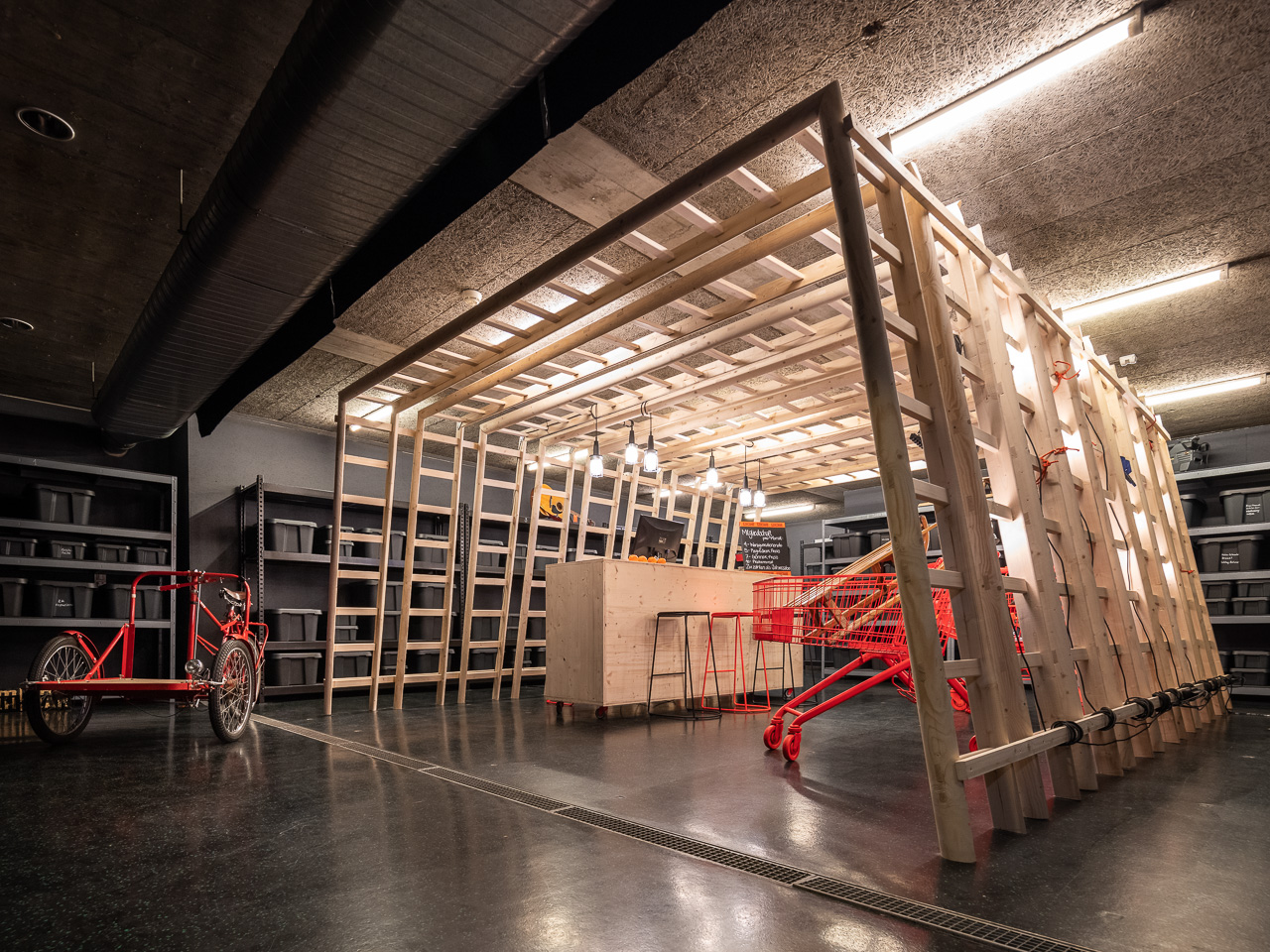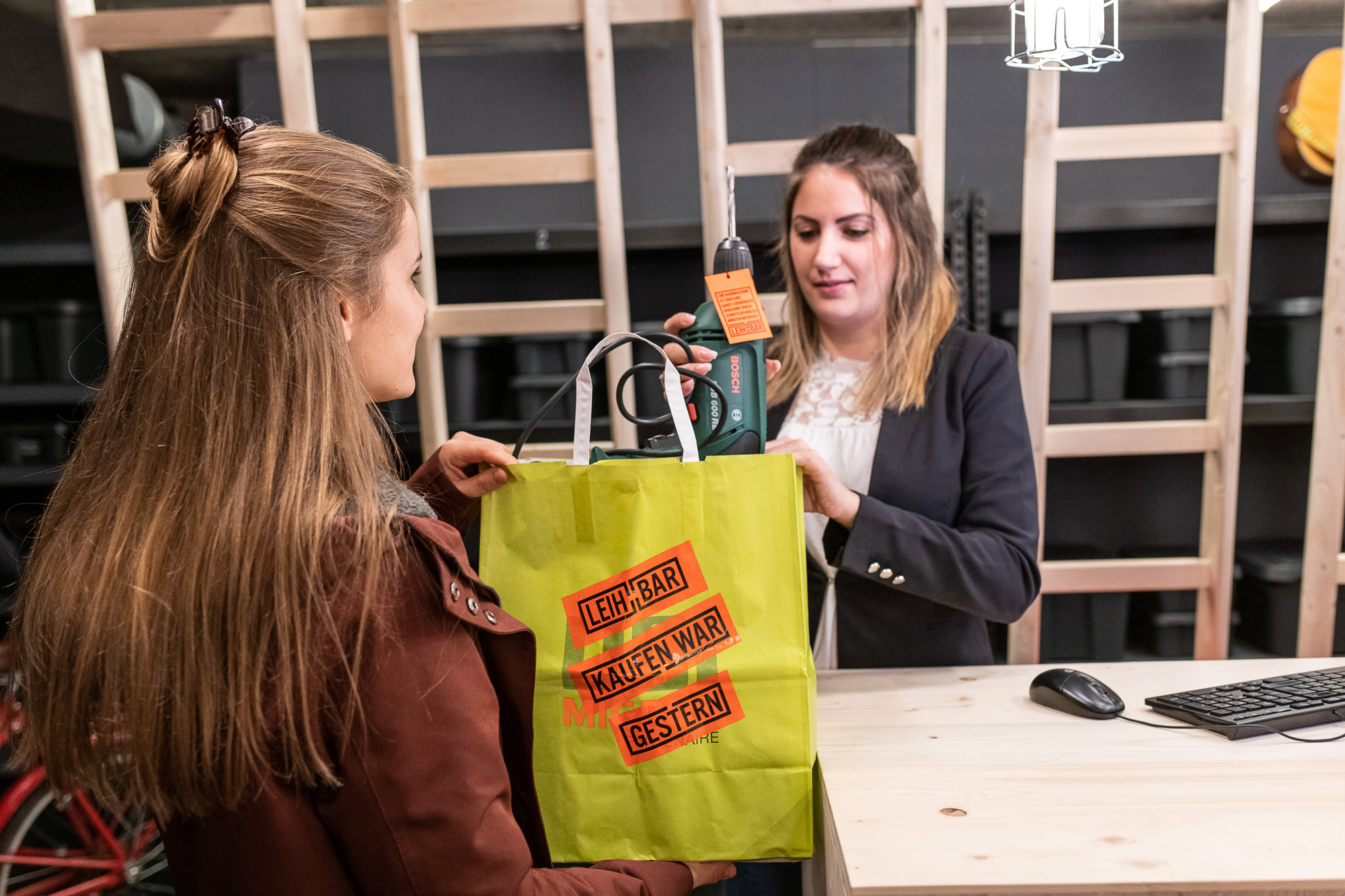Sharing Economy – sharing, borrowing, hiring. We are now discovering a new attitude to life.
Sabina Galbiati • 31.01.2019
Sharing things instead of buying them is becoming increasingly popular in Switzerland. But how sustainable is this really and why exactly are the prosperous Swiss celebrating the new attitude to life of sharing?
Throwing a party without any crockery, going camping without the equipment or boating on the river Aare without owning a rubber boat. In the world of sharing we simply borrow things, share them with our neighbours or rent them for a day or a month. You are what you share – a great new attitude to life.
Whether it’s via our mobile phones or at home on the laptop, thanks to the digitalisation of our everyday lives, we can share and hire things as easily as never before. It could be a holiday apartment, boxes for the next time we move home or an e-bike and it’s not only young people who want to share instead of own. The sharing economy is becoming increasingly popular. For example, over 55 percent of the Swiss are already using services from the sharing economy, as a study by Deloitte shows.
Although many sharing platforms are not yet profitable, they are still benefiting from the slipstream of the well-known platforms Airbnb and Uber. They have shown us how easy it is to share and borrow. Nowadays we no longer only share our cars and homes, but also all kinds of goods and services.
The term sharing economy only came about in 2008: But the idea of sharing is not new at all. Our grandparents shared washing machines, fridges and tools for financial reasons. Good old hitch-hiking, which we still only remember from our childhoods – if at all – has been taken over by car-sharing schemes such as Blablacar or Sharoo. Today we more or less hitch hike by a click of the mouse. But if we ever need a car, Mobility with its red runabouts is on the spot – and already has been since 1997.
Temporary drilling and sitting
Although sharing is well-established in areas such as mobility and travelling, the sharing economy is only just taking off in the lifestyle sector and particularly in Switzerland. Only at the beginning of December 2018 was the first borrowing bar opened in Switzerland by the Foundation for Consumer Protection. Here anyone can hire exactly what they need at the time for the price of a coffee per month: from the crockery set for a party to the rubber boat or outdoor projector for an unusual evening of cinema.
Another example: The sharing pioneer Pumpipumpe.ch. The association was founded in Bern in 2012, even before Airbnb and now operates across Europe: While the community was previously only able to order stickers, which showed what neighbours could borrow on people’s own letter boxes, a digital map is now available. With just a few clicks, you can find out which neighbours are lending something in the neighbourhood. A step into the future, which the association took at the end of 2017. When it comes to hiring and renting out, the platform Sharely.ch has already made a name for itself in Switzerland. It already has 15,000 users, who share their property or want to hire something and new users and items are being added every day. «The dynamics on Sharely have clearly accelerated and if it continues like this, we should be able to reach the break-even point at the end of 2020», says Sharely founder Andreas Amstutz. Sharely only launched its sharing app last year. An important step to reach the sharing community more easily and one, which the start-up took at exactly the right time.
This is because an increasing number of people are discovering minimalism as a lifestyle choice for themselves. They don’t want to own things, but will borrow whatever they need at the time. «In the meantime the sharing economy has become more “grown-up” and users know what a peer-to-peer platform is and regard hiring and lending items in a much more relaxed way than in the beginning», says Amstutz. Awareness of sustainability is also growing in Switzerland and the sharing economy is being treated as part of the solution in the battle against climate change.
The two faces of sharing
However, the sustainability coin has two sides and one of them is not at all shiny. This is because anyone who shares is not only saving resources, but also cash. «If the saved money is spent on other things, such as for a short trip to London, the sustainability effect has come to nothing» says Martin Peter. He is the Business and Environment Division Manager at the Infras research institute and co-author of the study «Sharing Economy – sharing instead of owning». «In extreme cases the overall effect of the sharing economy can also lead to an increase in the use of resources», explains Peter and gives an example. Although it would save resources if neighbours were to share a lawnmower, instead of each buying their own. «However, the decisive factor for the overall effect is what happens to the money, which people are saving.» If more of other things are consumed thanks to sharing and those things use more resources than the lawnmower that hasn’t been purchased – whether it’s now the additional hot air balloon trip or the larger LED television – then more resources are being used with the sharing economy instead of fewer. «The high average income permits such behaviour precisely in Switzerland.» It’s clear for Peter: «So that sharing and borrowing really save resources and become part of sustainable consumption, we need to have a re-think about using our resources with greater awareness.»
Someone, who sees things in exactly the same way, is Raffael Wüthrich. He is the project manager of the borrowing bar and is responsible for the Sustainability Division at the Foundation for Consumer protection. «I am sceptical about whether the sharing economy in Switzerland actually contributes very much towards saving resources», says Wüthrich. «In Switzerland lots of people can afford almost everything.» It’s therefore very easy to lend things out and pay for the next cheap flight with the money saved. «We want to counteract this mentality of consumption with the borrowing bar project – without any loss of prosperity.» Although the initial experiences seem to show that above all the people who lend things out are already very conscious about sustainable consumption. «But with the borrowing bar we want to appeal to a much wider audience and provide information about a sustainable lifestyle.»
40, male, educated, seeks
But what does this mean for an audience, which is prepared to share and lend? In the «Sharing Economy – sharing instead of owning» study the authors investigated precisely this question among others. For example men are more prepared to share than women. In addition, 36 to 55 year-olds are more likely to share and lend. Two other features: Anyone who earns really good money and has a university degree – in other words a good education – prefers to borrow something rather than buying it, or hires out his camping equipment.
Town dwellers want to get to know their neighbours again
A push for the sharing economy could also come from another direction: Town dwellers want to get to know their neighbours better again. «For town dwellers, who want to network in their district and are looking for proximity, but at the same time travel and are networked globally, the platforms like Pumpipumpe.ch are ideal», says Martin Peter.
Although the conditions in Switzerland are quite a good fit, the sharing market is still straightforward. However, the sharing economy definitely has opportunities here. The borrowing bar in Bern for example is a pilot project, which the Foundation for Consumer Protection wants to implement in every Swiss town, insofar as the experiment in Bern is a success. Thanks to the new digital access to the neighbour’s toboggan or drill, Pumpipumpe.ch can reach many more people.
Are you still buying or are you already trusting?
The success of the sharing economy depends not only on our living situation, education or our income, but also on the trust between the person hiring and the person hiring out. Trust between the «business partners» plays a central role, as the «Sharing Economy – sharing instead of owning» study shows. If we borrow camping equipment for the next camping trip, we must trust that it is intact and rain won’t suddenly come into the tent. Vice versa the person hiring out the equipment must trust that it is still in good condition when we bring it back. No one can guarantee this 100 percent. Digital assessment systems for providers and demanders can provide assistance here. Nevertheless both sides must be prepared to take a risk. And in the final analysis we must be patient, because in the sharing economy the camping equipment has sometimes already been borrowed by someone else.
No question:
With the right offers on sharing platforms, our trust and our willingness to take risks, the sharing economy can become a form of sustainable consumption. However, it also needs a re-think in society.
Photography: Matthias Luggen

